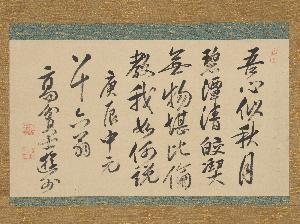Ko Yugai
Ko Yugai;Baisaō
Place: Hasuike
Born: 1675
Death: 1763
Biography:
Early Life and Spiritual Journey
Ko Yugai, also known as Baisaō, was a Japanese Buddhist monk of the Ōbaku school of Zen Buddhism, born in 1675 in the town of Hasuike, Hizen Province. His early life was marked by the loss of his father at the age of nine. This event likely influenced his decision to become a Zen Buddhist monk at Ryushinji, an Ōbaku temple, where he adopted the name Gekkai Gensho.
The Tea Seller and Artist
As Ko Yugai matured in his spiritual journey, he became famous for traveling around Kyoto selling tea. This unique approach to spreading Zen Buddhism's teachings earned him the name Baisaō, meaning "the old man who sells tea." His method involved carrying a bamboo tube to collect donations, rather than selling his tea for a fixed price.
Artistic Contributions
Ko Yugai'spoetry and calligraphy are highly regarded in the Zen history of Japan, particularly in Kyoto where he was well known. His tea shop became an influential hub for artists and poets, making him a friend and confidant to many leading cultural figures of his time.
- Key Artistic Contributions:
- His poetry reflects a deep understanding of the Japanese tea ceremony and its place in Japanese culture.
- His calligraphy is characterized by its elegance and refinement, often studied and appreciated today.
Legacy and Later Life
In 1745, at the age of seventy, Ko Yugai renounced his monasticism, changing his name to Ko Yugai. He stopped selling tea in 1755 but continued to influence Japanese art and culture through his work.
- Notable Art Pieces:
- Flowering Cherry with Poem Slips (held at the Art Institute of Chicago, though not directly associated with Ko Yugai, showcases a similar style and influence)
- Four Accomplishments by Kano Motonobu (Metropolitan Museum of Art in New York City), reflecting the broader influence of Japanese art on the Kanō school style
Conclusion
Ko Yugai'slife and work continue to inspire, embodying the essence of Zen Buddhism and its integration with everyday life. His legacy as a tea seller, poet, and calligrapher remains an integral part of Japanese cultural history.
- Explore More:
- Ko Yugai's profile on Wikioo.org
- The Yamato e Art Movement, reflecting the broader context of Japanese art
- Reisai Gukyoku's profile, another influential figure in Japanese Buddhist art
References:
- The Bunjinga Art Movement, for insights into literati painting influences
- Wikipedia, for general information on Zen Buddhism and Japanese art history

